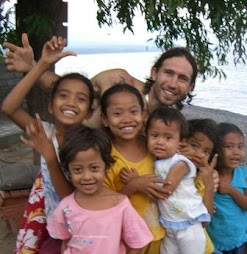 Welcome to Africa!
Welcome to Africa! This is my first field report from my humanitarian trip to West Africa.
Here is a video intro:
http://fr.youtube.com/watch?v=3UgrWX0UJqg
AFRICAN AID #1: Sweetness Helps Low Blood Sugar
On the eve of my recent birthday, #34, my thoughts centered on my child hood hero, Walter Payton, the record-breaking Running Back for the Chicago Bears. As a child, I idolized #34 for his amazing blend of agility, speed and power, but what really impressed me as I matured were his off-field attributes: grace, dignity and compassion. Though involved in local charities for years, he became a spokesperson for organ donors after contracting a rare liver disease in 1999. On that day when “Sweetness” was laid to rest, thousands flocked to Chicago's football stadium to watch, while countless others, watching from afar on TV felt touched by his spirit.
In honor of his legacy, as I tururned 34, I christened this “The Year of Sweetness.”
Soon after my arrival here in West Africa, wandering Senegal's bustling and overcrowded capital Dakar, I attended a UN-sponsored information session about diabetes, which is growing at an alarming rate in Africa. Though the disease was never seen on this continent a century ago, there are now over ten million people suffering from the disease today and estimated to be twice that by 2025! Though millions suffer from consequences of the disease, such as amputations and blindness, countless others die of diabetes before even being diagnosed with the disease. Around here, insulin is a health cost many cannot afford.
Watching the insulin enter his weakened body reminded me of a withered plant that suddenly comes back to life after a nourishing rain. Suddenly, this worried man who minutes earlier had nearly been hit by a car due to his weakened eye sight and desperation looked up at me and smiled.
“Thank you my friend. You have no how much better I feel. Just when I think God is finished with me, he places help in my path to restore me.”
Komla's story is laden with difficulty. As a teenager, he started suffering from a melange of maladies, such as drowsiness, heavy breathing and bloody gums. Since his diagnosis seventeen years ago, his sight has worsened, twenty-two of his teeth have fallen out and he suffers from skin and foot problems. In 2005, he fled his native Togo after his political violence swept the country after his president's death. He traveled to Mali and then to Dakar in order to study tele-communication and is set to graduate from Chiekh Anita Diop University in three months. Sadly though, there is no government help for diabetics in Senegal (or Togo) and no health insurance companies will cover him based on his condition. This puts Komla in a perilous situation until he can graduate from university and look for work. He has relied on the help of a few individual foreign expatriates in Dakar to help him buy his insulin (and buy dentures for his teeth), but the American military officer that has helped him the most is back in the states for a few months. I am currently researching projects that provide insulin to needy patients in Africa, and have found a program sponsored by the International Diabetes Federation to see if Komla might qualify for assistance. But for the time being, in the name of 100 Friends and my generous donors, I was able to buy our suffering friend a supply of insulin to last him until his graduation and/or the return of his benefactor.
The next day, when Komla was back to his usual jovial self, we shed our benefactor/recipient role and spent the day as friends. As we sat on the nearby N'Gor Island eating fresh grilled fish, I told him about how my favorite childhood teacher had recently undergone an amazing recovery from diabetes after undergoing a kidney transplant. We also spoke about the new African hero Barack Obama and my childhood idol Walter Payton. Komla wisely reflected that these three men, each in their own way, provided him hope for the future.
“But Adam, I have one question for you? How did you know that I am also 34 years old?”
Laughing, I assured him I had no idea. Must be Sweetness' spirit looking down, I said.














1 comment:
You truly have the spirit of "Tikun Olam".
What the world needs now are more adam Carters.
Stan
Post a Comment